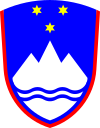
The Slovenian Democratic Party, formerly the Social Democratic Party of Slovenia, is a conservative parliamentary party and the largest party in Slovenia with approximately 30,000 members. The key goals of the party are democracy, respect for human rights, economic efficiency, economic freedom and solidarity.

New Slovenia – Christian Democrats is a Christian-democratic and conservative political party in Slovenia. Since 2018, it is led by Matej Tonin. The party was formed on 4 August 2000 following a split in the unified Slovenian People's Party and Slovene Christian Democrats (SLS+SKD). NSi is a member of the European People's Party (EPP) and in the European Parliament its MEP Ljudmila Novak sits with the EPP Group.

The Social Democrats is a centre-left and pro-European social-democratic political party in Slovenia led by Tanja Fajon. From 1993 until 2005, the party was known as the United List of Social Democrats. It is the successor of the League of Communists of Slovenia. As of 2022, the party is a member of a three-party coalition government with Robert Golob's Freedom Movement alongside The Left, as well as a full member of the Party of European Socialists and Progressive Alliance.

Parliamentary elections were held in Slovenia on 21 September 2008 to elect the 90 deputies of the National Assembly. 17 parties filed to run in the election, including all nine parliamentary parties. The election was won by the Social Democrats (SD), who then went on to form a government together with Zares, Liberal Democracy of Slovenia (LDS) and the Democratic Party of Pensioners of Slovenia (DeSUS).
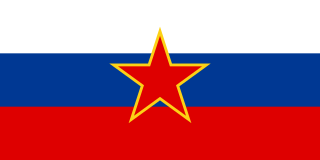
The Socialist Republic of Slovenia, commonly referred to as Socialist Slovenia or simply Slovenia, was one of the six federal republics forming Yugoslavia and the nation state of the Slovenes. It existed under various names from its creation on 29 November 1945 until 25 June 1991.

Gregor Virant is a Slovenian politician and public servant. Between 2004 and 2008, he served as Minister of Public Administration in Janez Janša's first government, between 2011–2013 he was Speaker of the National Assembly of Slovenia. He also served as Minister of the Interior and Public Administration in the government of Alenka Bratušek between 2013 and 2014.
The Government of the Republic of Slovenia exercises executive authority in Slovenia pursuant to the Constitution and the laws of Slovenia. It is also the highest administrative authority in Slovenia.

Parliamentary elections were held in Slovenia on 4 December 2011 to elect the 90 deputies of the National Assembly. This was the first early election in Slovenia's history. The election was surprisingly won by the center-left Positive Slovenia party, led by Zoran Janković. However, he failed to be elected as the new Prime Minister in the National Assembly, and the new government was instead formed by a right-leaning coalition of five parties, led by Janez Janša, the president of the second-placed Slovenian Democratic Party. The voter turnout was 65.6%.
Civic List is an inactive classical-liberal extra-parliamentary political party in Slovenia, led by Gregor Virant. LGV won 8.37% of the vote at the early 2011 Slovenian parliamentary election on 4 December 2011, thus gaining 8 seats in the National Assembly. After a quit of its deputy group by one of its deputies in April 2012, it has had 7 seats. Until April 2012 the party was named Gregor Virant's Civic List.
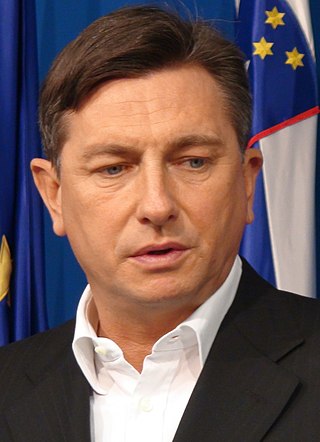
Presidential elections were held in Slovenia on 11 November 2012, with a run-off held on 2 December 2012. Slovenia's 1.7 million registered voters chose between the incumbent president Danilo Türk, the SDS/NSi party candidate Milan Zver and Borut Pahor of the Social Democrats who was also supported by the Civic List. The first round was won, contrary to the opinion poll predictions, by Pahor, with Türk placing second. In the run-off election, Pahor won with roughly two-thirds of the vote.

Parliamentary elections were held in Slovenia on 13 July 2014 to elect the 90 deputies of the National Assembly. The early election, less than three years after the previous one, was called following the resignation of Alenka Bratušek's government in May. Seventeen parties participated, including seven new parties, some of which formed only months before the election took place. Party of Miro Cerar (SMC), a new party led by lawyer and professor Miro Cerar, won the election with over 34% of the vote and 36 seats. Seven political parties won seats in the National Assembly. Three political parties left the Assembly, including Zoran Janković's Positive Slovenia, the winner of the 2011 election. A leftist United Left party entered the Assembly for the first time, winning six seats.

The Party of Alenka Bratušek was a political party in Slovenia. The party was founded on 31 May 2014 as the Alliance of Alenka Bratušek. The party was formed by Alenka Bratušek, who resigned as Prime Minister of Slovenia on 5 May 2014, and other former members of Positive Slovenia.

2014 European Parliament elections were held in Slovenia on 25 May 2014. It was the first in the series of three elections held in the 2014, and the major test leading up to the parliamentary elections in July. The political atmosphere was in a crisis that started with the fall of Borut Pahor's government, then Janez Janša's government in 2013, the latter coming after Janša was accused of corruption. The cabinet of Alenka Bratušek was breaking up, as the former leader of the Positive Slovenia Zoran Janković, who was under the suspicion of corruption, announced his candidature for party president, even though the coalition parties threatened to leave the government if he was to be elected, which later he was.
In the run up to the 2018 Slovenian parliamentary election, various organisations carry out opinion polling to gauge voting intention in Slovenia. Results of such polls are displayed in this article.

Parliamentary elections were held in Slovenia on 3 June 2018. The elections were originally expected to be held later in June 2018, but after the resignation of Prime Minister Miro Cerar on 14 March 2018 all parties called for snap elections. They were the third consecutive snap elections after 2011 and 2014.
Presidential elections were held in Slovenia on 22 October 2017. Nine candidates ran in the first round of the elections, in which the incumbent independent President Borut Pahor placed first and Marjan Šarec of the List of Marjan Šarec (LMŠ) placed second. No candidate received a majority of the vote in the first round, resulting in a run-off between Pahor and that was held on 12 November 2017. Pahor won the run-off with 53% of the vote; voter turnout in the second round was 42.13%, the lowest in any presidential election since independence.

The Left is an eco-socialist and democratic socialist political party in Slovenia. The party was established on 24 June 2017 by the merger of the Party for Sustainable Development of Slovenia (TRS) and Initiative for Democratic Socialism (IDS). The party is a successor of the left-wing electoral alliance, the United Left.
A referendum on a law governing the Divača-Koper rail upgrade was held in Slovenia on 24 September 2017. The referendum was marked by a low turnout; a majority of voters voted in favour of the proposed law. The results were annulled by the Supreme Court in March 2018, resulting in a new referendum being held in 13 May 2018.
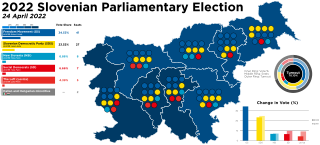
Parliamentary elections were held in Slovenia on 24 April 2022 to elect all 90 members of the National Assembly.
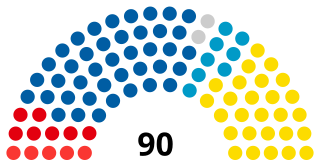
The 9th National Assembly of the Republic of Slovenia was established by decree of the President of the Republic, Borut Pahor, based on the legislative election held on 24 April 2022.
